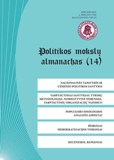Kas yra švelnioji galia? Sąvokos ribos ir empirinių tyrimų metodologijos apmatai
What is Soft Power? Conceptual Limitations and Methodological Guidelines
Author(s): Vytautas IsodaSubject(s): Politics / Political Sciences
Published by: Vytauto Didžiojo Universitetas
Keywords: švelnioji galia; Josephas Nye; konstruktyvizmas; metodologija; metodai; soft power; S. Joseph Nye; constructivism; methodology; methods
Summary/Abstract: Nors ir plačiai vartojama, „švelniosios galios“ sąvoka iki šiol neturi visuotinai priimto turinio ir aiškios vietos tarptautinių santykių teorijoje(-ose). Neoliberalizmo stovyklai priskiriamo sąvokos autoriaus Josepho S. Nye darbai sulaukė gausios konstruktyvistinės kritikos, kuria implikuojama, jog švelniosios galios tyrimai galėtų / turėtų būti grindžiami konstruktyvistine metodologija. Švelnioji galia pagal apibrėžimą turi aiškių sąsajų su socialinės struktūros raiška, kurią labiausiai pažinti leidžia būtent konstruktyvizmas. Šiame straipsnyje bandoma pateikti nuoseklesnę švelniosios galios sampratą ir aiškesnes metodologines gaires empiriniams tyrimams. Siūloma metodologija apima socialinės struktūros pažinimą ir konkretaus švelniosios galios veikimo „epizodo“ veikėjų tarpusavio santykiuose paaiškinimą. Šios dvi dimensijos papildo viena kitą ir gali sudaryti vientisą išsamaus tyrimo planą toje pačioje teorinėje sampratoje. The concept of “soft power”, although widely used, does not have an agreedupon meaning or a well defined place within the international relations theory(-ies). The author of this concept Joseph S. Nye, conventionally associated with neoliberal theory, has been heavily criticized by constructivists, implying that the researches on soft power could / should be grounded in constructivist methodology. Soft power, by definition, has its roots in the social structure of international system, which is best approached in constructivist manner. This article is an attempt to develope a more consistent conception of soft power and more explicit methodological instructions for empirical research. The methodology proposed here includes: 1) a deeper inquiry into the social structure mentioned above and 2) an explanation of a particular event where soft power was exercised. These two dimensions supplement each other and are meant to comprise a single design of a comprehensive research.
Journal: Politikos mokslų almanachas
- Issue Year: 2013
- Issue No: 14
- Page Range: 37-61
- Page Count: 25
- Language: Lithuanian

